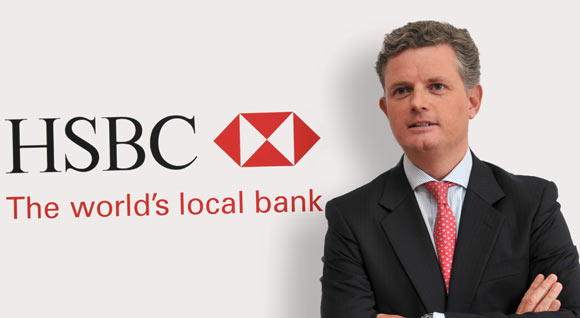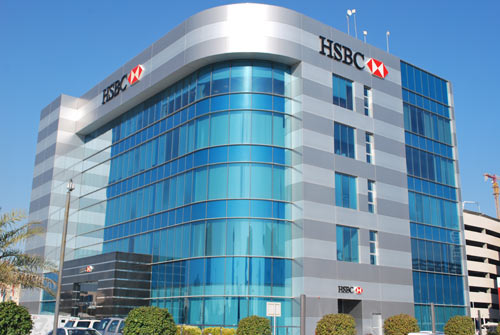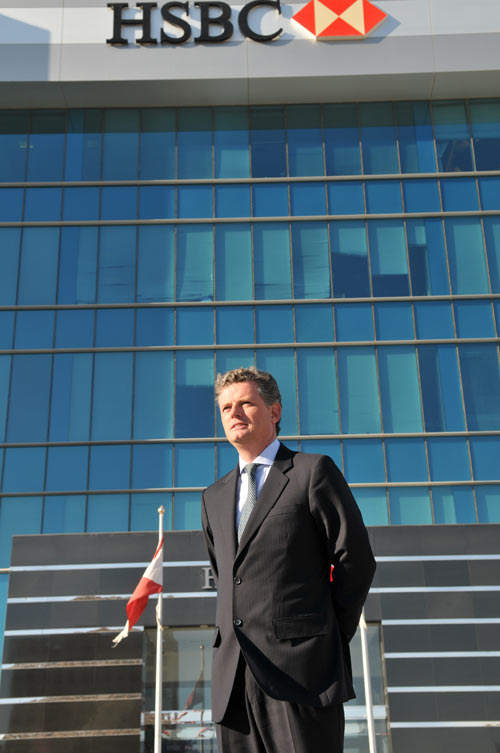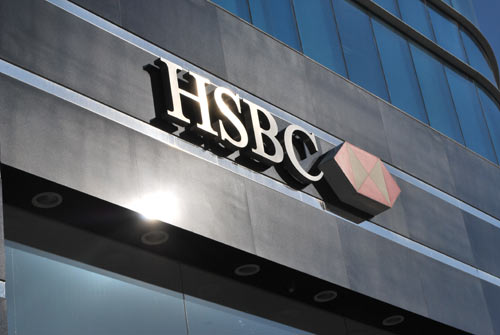HSBC Bank Bahrain: Retail and Corporate Banking in Bahrain Remains Strong
Patrick Gallagher, Chief Executive Officer of HSBC Bahrain
The whole banking environment and the economy in general was looking forwards to a strong 2011 and, clearly, with the events of mid-February, we did loose a couple of months, but what we have seen in the last few weeks a renewed beginnings of confidence.
Interview with Patrick Gallagher, Chief Executive Officer of HSBC Bahrain

How vulnerable is the private sector (also banks) in Bahrain to the events?
Certainly, the corporates who are associated with the retail and leisure side have been quite heavily affected. We have seen hotel occupancy rates reduced in some cases down to as low as 10% and shopping in the retail malls was very visibly affected, too. Yet this area is now slowly improving and we have seen visitors especially from Saudi Arabia and Kuwait come back in the recent weeks; those numbers have improved and, hence, hotel occupancy rates and shopping in the malls has very positively improved in the last few weeks.
The whole banking environment and the economy in general was looking forwards to a strong 2011 and, clearly, with the events of mid-February, we did loose a couple of months, but what we have seen in the last few weeks a renewed beginnings of confidence, especially on the corporate side.
Looking at banking, our pipeline both in the retail and corporate side was also negatively affected during the month of February and March.
Again, we have seen in the very recent weeks that people have a bit more confidence to look towards the future and look towards re invigorating a corporate pipeline.
HSBC has been supporting SMEs in Bahrain since it first established operations here 65 years ago. What are the key advantages for international banks to establish their presence in Bahrain?
Bahrain has been one of the main financial services center in the Gulf since the mid 1970’s so it really has had decades to establish itself in financial services. The sector here is very large both in conventional and Islamic Banking, Insurance and in Fund Management. Also, because of that sort of lineage of being a financial services center, the ancillary industries around finance have grown up here as well.
We have a very strong legal system, the legal sector has a number of international legal firms, in addition we have a number of international accounting firms operating in Bahrain. This is a very open; very complex market. We have a very strong regulator which has been regulating the market for decades. The market presents quite a complex mix of financial instruments from pure retail through offshore, investment banking and wholesale banking.
The banking sector of Bahrain remained stable and working normally despite some problems in the past many weeks, according to Rasheed Al-Maraj, governor of Central Bank of Bahrain (CBB). However, Moody’s just cut Bahrain’s credit rating to Baa1 from A3, and put its outlook at negative. What are the biggest challenges of the banking sector in Bahrain?
I think it is important to put that rating downgrade in perspective because really what Moody`s was doing was coming in line with the other two main agencies: SNP and Fitch, which cut the ratings of the country earlier in the year.
Also it is interesting to look at the best proxy for risk in Bahrain, the credit default swap (CDS) market.
CDS spreads clearly gapped out very heavily just post crisis to its peak when we were about 350 points – in mid to late March. The CDS spreads have been coming in noticeably in recent weeks.
Now, we are in around 230 points. Thus, from its height of 350 we have come in roughly 120 points. We are still 50 points wide of where we started the year however.
What is the outlook for the banking sector in 2011?
The financial services sector is quite a large sector with many different players. Taking perhaps the single most important sub-sector which is domestic banking on the ground, we started the year extremely well; we had very strong January and early February coming off quite a strong 2010. The whole banking environment and the economy in general was looking forwards to a strong 2011 and, clearly, with the events of mid-February, we did loose a couple of months, but what we have seen in the last few weeks a renewed beginnings of confidence, especially on the corporate side.
Within corporate Bahrain, we are expecting a lot of projects to be announced especially in the oil and gas and aluminum industries, also around the production of low-cost housing and infrastructure – quite a few large integrated projects that will require financing. So, certainly, on the corporate side, the likely announcement of these projects will create a lot of knock-on flow for all sorts of different contractors, suppliers etc. within Bahrain.
At the same time the downgrade will mean that the cost of borrowing for the projects and their financing is going up.
I think that`s also an issue worth putting into perspective. 
We have a relatively small country, we have some of the world`s best foreign banks and some very competent local banks which are very well funded, very well capitalized. We have extremely strong banks willing to lend into the Bahraini market. The liquidity in Bahrain is very strong – it must be remembered that during the first months of the crisis the percentage of deposits that actually left the system and left Bahrain to either other countries in MENA or further field is a small single digit.
Therefore, what the crisis has produced is, frankly increased liquidity in the overall market. So we have banks – both foreign and local – looking for opportunity to lend and get involved both at the retail and corporate side
What is this attributed to? Could we say that Bahrain is supported by Saudi Arabia and that’s the real market and the banking is tight to Saudi Arabia?
The Saudi issue isn’t particularly significant when it comes down to domestic Bahrain banking. The financial services industry has grown here in domestic Bahrain for 35-40 years. Hence, a number of corporate banks, have been banking large/medium companies here for generations.
As an example, we have been 65 years in Bahrain and number of our clients we have banked in Bahrain for 50 years or so. It is really a continuation of that process; we are standing behind our large and medium size corporate clients which we have banked for generations.
Viva Bahrain, the newest player in the Kingdom’s telecom sector, has signed a $280 million Shari ‘a compliant financing facility with two of the region’s key financial institutions, HSBC and Saudi-based Samba. What are your expectations from this transaction? How do you see future evolution of your Islamic banking products?
We are delighted to help Viva; Viva`s parent – STC from Saudi – is a very large relationship of ours outside of the Kingdom of Bahrain. We have helped STC in Saudi itself and in their expansion plans in South East Asia. Helping STC with their plans in Bahrain is an extension of our relationship. For us, it is a very exciting plan.
I think the key issue for HSBC is really encapsulated in one word – connectivity – both on the retail and corporate side. We are present in 86 countries.
We have announced the opening of our corporate Shari ‘a business last December, so this was the first headline transaction within that new structure. As I look beyond VIVA, we are talking to a number of corporates about working with them in Shari ‘a compliant corporate manner. We have had for a number of years a suite of retail products – Shari ‘a compliant. Since last December we also now have full suite of corporate products which matches our retail offering;
You have mentioned that Bahrain is surely over-banked. There is over-saturation of the banks in Bahrain either on retail or corporate side. What is the edge of HSBC Bahrain over other banks in Bahrain?
I think the key issue for HSBC is really encapsulated in one word – connectivity – both on the retail and corporate side. We are present in 86 countries. On the retail side, expats who come to Bahrain are very likely to have an account in HSBC in some other part of the world. We simply plug Bahrain into their global financial planning. They might have an HSBC account in their home country or a country where they worked previously, in addition they can now access their Bahrain account and they can see all their accounts on one internet screen. 
On the corporate side it is even more beneficial because with a lot of our business here being trade-orientated – both on exports and imports side – we try at all cost to match up both sides of the transaction. If, for instance, a large corporate in Bahrain is importing from China, we as the largest corporate bank in China try to route the business in China to us as well, so we are basically marrying up both sides of the transaction be it on the export or import side.
This is something that domestic banks in Bahrain are unable to do given their relatively small footprint outside Bahrain or certainly outside of MENA.
This brings me to the next questions: what is your vision for HSBC Bahrain; what are your growth and investment plans; which kind of retail/corporate would you like to develop further; would you like to compete?
We compete right across the local market from credit cards through SME to MME to large corporates and also off-shore private banking. I think what we want to do is to do more of the same. All of those businesses at this point are particularly positive, so it is a continuation of more of the same in terms of all of those individual business lines.
Historically, we have been more of a corporate bank in Bahrain. We are growing in the MME space – the middle size business – and we are trying to extend that out to global banking businesses. We are trying to do more business with the sovereign – last year we were one of the lead underwriters on the inaugural bond issue for Mumtalakat, the sovereign wealth-fund, for instance.
How much space do you see for a future growth in Bahrain? It is a small island which has several projects but is still limited in size.
We do see a lot of plans in the pipeline for infrastructure Projects to assist the growth of the oil and gas sector, the aluminum sector, the production of low and medium cost housing – a lot of corporate plans in terms of fixing, building, growing the natural infrastructure of Bahrain. These are all Natural Projects for HSBC given our corporate background to assist all parts of the supply chain associated with those projects over the next 2 to 5 years.
From your personal experience in Bahrain, you have lived through the recent events, what is your take on this?
This is my second time to live in Bahrain; I was in Bahrain in 1990-91 during the first Gulf War and now I’m here again and it is great to be back. I have worked in a number of countries for HSBC but, as I said, it is great to be back in Bahrain for the second time. I think it is again the theme of perception and reality. I have a wife and family here – we had an unfortunate few days during the crisis, but in reality it has remained a particularly livable place; a place where I look forward to live for a lot longer going forward.